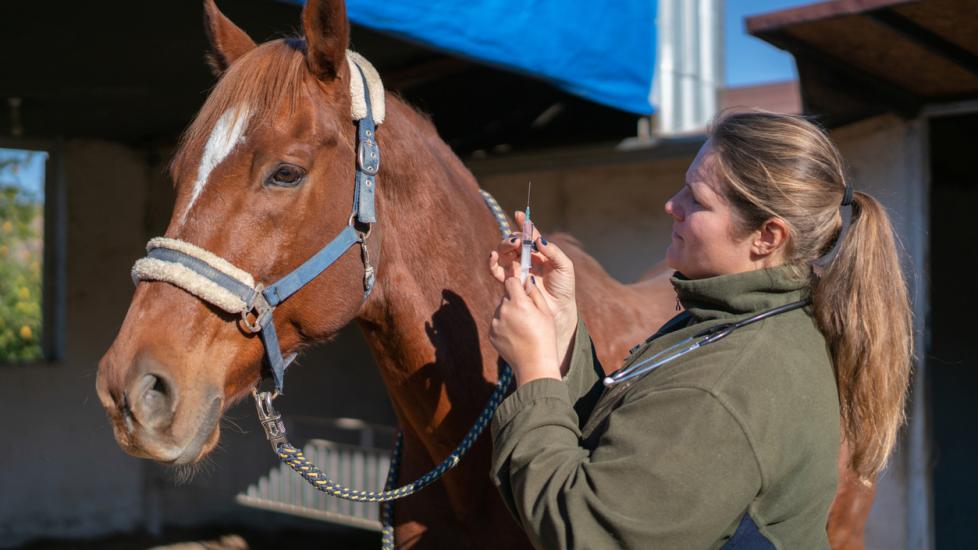Leptospirosis in Horses
What Is Leptospirosis in Horses?
Leptospirosis is a bacterial disease that is carried in the blood and urine of wild animals including rodents, small mammals (skunks, opossums), and even deer. Horses can become infected by coming in contact with the infected blood or urine of these animals.
There are many different strains of this bacteria. The strain that is most commonly seen in horses is Leptospirosis pomona (L. pomona). Horses of all breeds, ages, and lifestyles are at risk for this disease.
Leptospirosis is a concerning disease as it can have many possible effects in the horse including kidney injury, uveitis, and abortion. Leptospirosis is a zoonotic disease, meaning humans can be infected from the same sources as well.
Symptoms of Leptospirosis in Horses
Signs of leptospirosis in horses may include:
-
Fever
-
Lack of appetite
-
Uveitis
-
Placentitis (infection of the placenta) and abortion in pregnant mares
-
Hematuria (blood in the urine)
Causes of Leptospirosis in Horses
Leptospirosis is transmitted through the blood and urine of infected animals. Horses most commonly contract it by drinking from contaminated water or eating contaminated food. It can be transmitted through contact with any mucous membrane (eyes, nose, mouth) or even open cuts and wounds.
Rodents and small mammals are the most common reservoirs. These animals may not appear sick, but they can still carry the leptospirosis bacteria in their blood and urine.
Mares on breeding farms can also transmit it to one another through contaminated birthing fluids. Therefore, mares who experience spontaneous abortion should be kept separate from others on the breeding farm.
How Veterinarians Diagnose Leptospirosis in Horses
Antigen and antibody testing can be used to diagnose leptospirosis. In cases of abortion, PCR (polymerase chain reaction) tests are usually performed on fetal fluid to confirm infection.
Treatment of Leptospirosis in Horses
In all cases, antibiotics such as Doxycycline will be used to treat the infection itself. Beyond that, additional treatment will depend on the individual case.
In cases of acute kidney injury, IV fluids and general supportive care are important. Your veterinarian will also instruct you to avoid medications that are hard on the kidneys, such as NSAIDs unless truly necessary.
For horses that present with uveitis associated with leptospirosis infection, treatments will be more directed toward controlling the inflammation in the eye. This will typically include topical steroid-containing ointments or drops as well as systemic anti-inflammatories (Bute, Banamine, Equioxx). Some horses may require antibiotics to be injected directly into the eye to fully clear the infection.
In pregnant mares who abort from leptospirosis, treatment has come too late to save the foal. Since these mares are often asymptomatic before the abortion, it is unfortunately difficult to identify and treat before the loss of the foal. It is still a good idea to treat the mare with antibiotics and supportive care. Biosecurity is key to prevent other mares from becoming infected.
Recovery and Management of Leptospirosis in Horses
Most horses with mild cases of leptospirosis recover with no long-term side effects and can return to their normal routines.
Horses that develop uveitis secondary to leptospirosis may have long-term eye issues, specifically, Equine Recurrent Uveitis (ERU). ERU often requires chronic pain and inflammation management and can potentially result in permanent blindness.
Prevention of Leptospirosis in Horses
While there is a vaccine for leptospirosis, it is relatively new and not commonly used in locations where leptospirosis is not prevalent.
The most common way to prevent leptospirosis is to remove any areas of standing water and to clean water buckets and feed containers regularly.
Leptospirosis in Horses FAQs
Can leptospirosis be cured in horses?
Yes, leptospirosis is a bacterial infection and can be cured with antibiotics.
How do you know if an animal has leptospirosis?
If your horse is showing symptoms consistent with leptospirosis, you veterinarian may want to perform antigen or antibody testing to confirm the diagnosis. These tests are important to make sure the right treatments are pursued.
Is there a leptospirosis vaccine for horses?
There is a vaccination available for leptospirosis in horses. Talk with your veterinarian about whether or not you are in an area where this vaccine is recommended.
References
AAEP. AAEP Publishes Leptospirosis Guidelines. AAEP.
Divers, Thomas. Equine Leptospirosis (Proceedings). DVM 360.
Featured Image: iStock.com/mgstudyo
